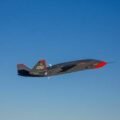With hopes of improving the training of future U.S. military leaders, researchers at Purdue University have developed a cutting-edge simulation program that offers students a virtual reality 3-D tour of the famed WWII D-Day battle at Normandy, France. By taking this up-close look at an actual historical battle, the project’s promotional video says users will be able to “experience the invasion of Normandy like never before,” following “the progress of the first two waves to land on Omaha Beach.” The video tells users they can “replay the battle minute by minute, with historical troop movements, terrain contours, and defenses.”
Part of the FORCES (4S – Strategy, Security and Social Systems) Initiative at Purdue University’s West Lafayette, Indiana campus, the program was designed to promote “research and instruction to improve decision-making in present and future global leaders.”
“Omaha Beach, the site of our simulation, is a textbook example of a difficult operation, full of uncertainty,” said Dr. Sorin Adam Matei, Associate Dean of Purdue’s College of Liberal Arts, in a response to The Debrief, “and prone to high human losses, as in fact it was.” He continued, “Our model allows running the battle under various scenarios to obtain new outcomes for different decisions. We can increase or decrease the volume of fire, speed, number of troops, and morale on either side. This allows asking various questions, such as, ‘What were the more favorable courses of action? How could the losses be minimized? How can operations like this be optimized, given modern weapons and operational speed?’”
“A key aspect is creating and sharing new ways to teach military history, plus to further study and understanding of the military arts and sciences,” said Robert Kirchubel, a retired Army lieutenant colonel and member of the FORCES team. “I’m most excited about the project’s potential: to turn the clock back, [and] display a famous battle in a technologically leading-edge fashion in order to bring military history alive to a new generation of students and scholars.”
According to the initiative’s website, another of its stated goals is to support “the use of social scientific research in strategy and security activities to shape long-range and global military, political, and organizational decision-making for a just, stable, and secure world.”
With these primary goals in mind, the FORCES team aims to connect the project to the annual Grand Strategy Seminar held by the Air Force’s Air War College (AFWC). With travel to Normandy often part of the curriculum, the seminar should be the ideal location for the team to display the cutting-edge tool.
“We are currently in a collaborative relationship with the Seminar,” said Dr. Matei. “We participated in their wargames last year, and we intend to participate again in the future. Furthermore, the project is in part built to complement the annual AFWC trip to Normandy, as a teaching material.”
As far as long-term plans, the program also hopes to significantly improve the interactive functionality of the simulation. According to the video, “Future iterations will include dynamically simulated forces, allowing for alternate scenarios to be created and tested in real time.” The program also hopes to expand their simulations to other well-known engagements—including the Civil War battle of Gettysburg—and, according to Dr. Matei, “a new simulation that will look at the emerging area of conflict in the South China Sea.” The team has also formed a start-up named FORCES Inc., which aims to commercialize the product.
“We are building this with help and with the encouragement of colleagues from professional military education institutions,” Dr. Matei told The Debrief. “Our advisory board includes scholars and military officers from the Naval Postgraduate School, West Point, and Air War College. Our team members include Air Force, Naval, and Army current or former officers.”
Given the impressive resumes of the entire team, including Professor Matei, engineering professor Jonathan Poggie, and retired colonel Kirchubel, along with the initiative’s distinguished advisory board, the project seems well-positioned to enhance training and wargaming of future U.S. military leaders. Or, as Dr. Matei told The Debrief, “The data science revolution has arrived in the military HQs, and we are a part of it.”

